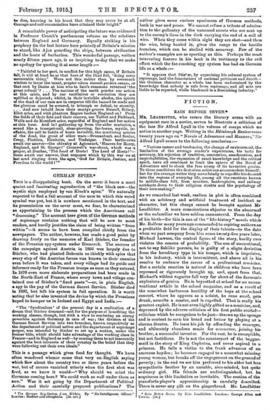GERMAN SPIES.*
Tins is a disappointing book. On the corm• it bears a most quaint and fascinating reproduction of " the black cow—the mystic sign employed by von Black's spies." We naturally expected to find a full account of the uses to which this weird symbol was put, but it is nowhere mentioned in the text, and its presentation on the cover must, we fear, be characterized as appertaining to the process which the Americans call "drowning" The account here given of the German methods of espionage contaica nothing that will be new to most renders, and hardly justifies the claim of being written "from within "—it seems to have been compiled chiefly from the newspapers. The author, however, has made a good point by drawing freely on the memoirs of Karl Stieber, the founder of the Prussian spy-system under Bismarck. The success of the campaign against Austria in 1866 was largely due to Becher, who had planted Bohemia so thickly with spies that every step of the Austrian forces was known to their enemies even before it was taken, and every village bad its guide and informer ready for the Prussian troops as soon as they entered, In 1870 even more elaborate preparations had been made in the North-East of France, where every town and village con- tained one of Stieber's " fixed posts "—or, in plain English, a spy in the pay of the German Secret Service. Stieber died in 1892, but left his system in full operation. It is worth noting that be also invented the device by which the Prussians hoped to hamper us in Ireland and Egypt and India "The 'Syndicalism' of the present day is a realization of a dream that Stieber dreamed—not for the purpose of benefiting the working classes, though, but with a view to rendering an enemy powerless against Germany in ease of war; the division of the German Secret Service into two branches, known respectively as the department of political action and tho department of espionage proper, was intended by Stieber to set up a section, under the former title, which should take advantage of the working class in Franca—and in England as well—by causing them to act innocently against the best interests of their country in the belief that they were following out their own ideals."
This is a passage which gives food for thought. We have often wondered whence came that very un•Engliah saying which flew about the country two or three years before the war, but of course vanished utterly when the first ebot was fired, as we knew it would—" Why should we mind the Germane coming here P We could work as well under them as now." Was it set going by the Department of Political Action and their carefully prepared publications P The • The Gerson Sni-Spaten■ low Math. By • FnIntalliwown Clffir•n" louden, Hodder en*Stooghtoa pa net] author gives some curious specimens of German methods, both in war and peace. We cannot refuse a tribute of admira- tion to the gallantry of the unnamed scouts who are sent up to the enemy's lines in the dark carrying the end of a coil of wire. When they come within sight they are shot—and then the wire, being hauled in, gives the range to the hostile trenches, which can be shelled with accuracy. Few of the author's examples are so sporting as this. Perhaps the most interesting feature in his book is its testimony to the evil effect which the far-reaching spy system has had on German life as a whole "It appears that Stiel-er, by organising his colossal system of espionage, laid the foundations of national pettiness and deceit— the German character as a whole has been undermined by the knowledge that nobody is safe from espionage, and all acts are liable to be reported, while blackmail is a flourishing industry."






































 Previous page
Previous page